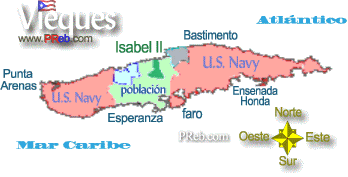
Vieques
Puerto Rico's Little Island
por Luis R. Negrón Hernández
Translated by Ann Shevlin
(c) CopyRight - Prohibido copiar, reproducir
We don't have the weapons to sink their naval
forces but we have the
weapon to sink their
prestige in the world. - Pedro Albizu Campos

HISTORICALLY, Vieques was always coveted by various European powers for its strategic
military position and its
magnificent ports.
At the end of the 17th
Century, the island
was nearly devoid of Spanish
inhabitants.
The English and the Dutch
coveted it. English
troops succeeded in occupying
it on several
occasions, but in 1718
were defeated anew
by the Creole forces from
the "Big Island"
(Puerto Rico). On the occasions
when the
British did occupy the
island, they offered
refuge to fugitive slaves from Puerto Rico.
Among the more colorful
characters who fought
against the Anglo Saxons
was the Mulatto
Puerto Rican corsair, Miguel
Henríquez. For
the good services rendered
with his fleet
of privateer ships, the
King of Spain conferred
upon him the title of "Captain
of the
Sea and War and Outfitter
of the Corsairs
of Puerto Rico", and even
named him
"Knight of the Royal Effigy".
 Vieques covers a total of 33,000 acres, 22,605
acres of which are currently
occupied by
the United States Navy.
The Navy began operations
there in 1935, and in 1941
acquired the land
in the western part of
the island. In 1944
they constructed a 107-building
Center for
the storage of munitions.
Later, they built
a 5,000-foot long airstrip
in the south of
the island. Vieques covers a total of 33,000 acres, 22,605
acres of which are currently
occupied by
the United States Navy.
The Navy began operations
there in 1935, and in 1941
acquired the land
in the western part of
the island. In 1944
they constructed a 107-building
Center for
the storage of munitions.
Later, they built
a 5,000-foot long airstrip
in the south of
the island.
The North American forces
use our "Little
Island" as a firing range
for the North
Atlantic Fleet, for amphibian
exercises,
field exercises for the
Marines, and for
staging practice invasions
other countries
-- recently with the pilots
who later were
sent to Serbia.
We Puerto Ricans have been
asking for decades
for the removal of the
Navy, whose presence
has caused serious ecological,
commercial,
archaeological, tourism
and health damages
to the Puerto Rican population.
Recently,
it was discovered that
the U.S. Navy has
used radioactive components
on the island.
The people of Vieques suffer
the highest
cancer rates in all of
Puerto Rico.
Given the stoppage of naval
exercises by
Puerto Rican militants
who believe in civil
disobedience, the Navy
moved its exercises
for a few short weeks to
the coast of the
United States. Within a
few days, hundreds
of North Americans living
nearby began to
complain about the noise
and about the way
their homes shook with
the explosions and
disturbed their sleep.
Faced with this situation,
so critical to
our national history, the
pro-statehood government
in Puerto Rico -now defeated- adopted a servile posture. It acts against
the best interests of the
Puerto Rican people,
turning its back on the
people of Vieques,
and in defiance of the
universal postulates
of justice and peace.
But a people standing,
not kneeling, militant
and not submissive, will
show that our country
is to be respected!

When and how did the powerful
United States
Navy come to Vieques, and
the people of Puerto
Rico fight to expel them
from our shores?
Read about the course of
these events in:
- Cronología del caso de la Marina en Vieques:
1940-2000.
We also invite you to read:
- Simón Bolívar en Vieques.
* Música de fondo: danza "Isla hermosa",
de Luciano Quiñones Lugo.
|
|